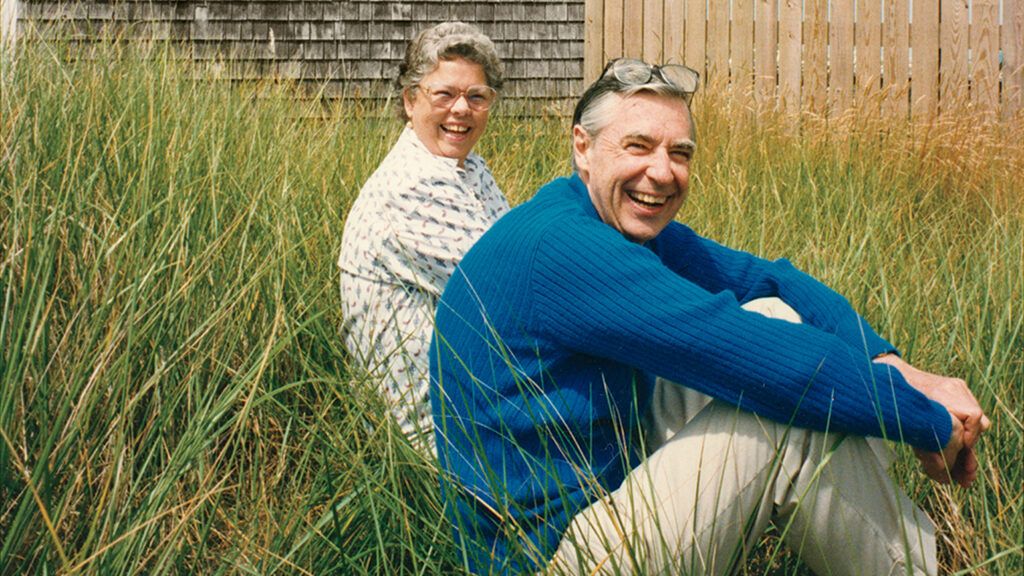The first time I set eyes on Fred Rogers was in 1947. I was a student at Rollins College in Florida, and he was a freshman at Dartmouth College in New Hampshire, who decided that he wanted to major in music. Dartmouth did not have a music degree program at that time. A music professor there suggested he come down to Winter Park to see Rollins. Our music composition teacher said we should all go greet him, so we piled into a very big, elderly Franklin car to meet this new prospect at the airport. And so it was that this unhappy Dartmouth student was welcomed by a dozen happy Rollins music students!
It must have worked because he decided to transfer to Rollins. We became good friends, then a couple. He impressed us because he could sit at the piano and play all kinds of music by ear that none of us could play without the score. After I graduated in 1950, I went to Florida State University for a master’s degree in music. After Fred graduated in 1951, he moved to New York City to do an apprenticeship at NBC in this new thing called television. I got a letter from him in late spring proposing marriage! I felt he deserved a quick response, quicker than writing back, so I went to a phone booth on campus…. I must have put in a million dimes! “Yes!” I said. “Yes.”
The wedding was July 9, 1952. Fred and I spent our first year together in New York, and Fred continued at NBC. In 1953, he heard from his father about plans for an educational TV station in Pittsburgh—near their home in Latrobe. Fred landed a job with this brave group and joined the first community educational television station, WQED. And so we settled in Pittsburgh.
He worked behind the scenes at first, then in front of the camera. He launched a children’s show in Canada that was called Misterogers—all one word like that—and developed a lot of the characters he would use in Mister Rogers’ Neighborhood, which he produced back in Pittsburgh. People ask if I helped him create any of it or collaborated with him. I have to confess that I was too busy.
I taught piano, gave recitals and was soon preoccupied with raising our two young sons, Jim and John. Sometimes the three of us would go to the studio and see Fred at work, which we loved. When the boys were young, running around the house, and the show would come on, they would point to the TV and the man in the cardigan sweater and say, “Other Daddy.” Their daddy was a father figure for children all over the United States.
That zippered sweater became his trademark on camera. Off camera he was more likely to wear a bow tie. That bow tie once led to an amusing case of mistaken identity. Fred came home from a trip one day with a big smile on his face. “What are you smiling about?” I asked.
“Something that just happened on the trip home,” Fred said.
“What was it?”
“I was getting on the plane, going up the ramp, and the flight attendant kept staring at me. You could almost see the wheels going around. She knew she knew me but was trying to remember how. When I came up to her, I smiled and she said, ‘I just love your popcorn!” They called him Orville (Redenbacher) at the office for a week after that!
Fred was a lot more patient than I ever was, especially with our children. The boys would tell you he never once raised his voice. I’m afraid that wasn’t always true for me. One day, my mother was visiting and the boys were horsing around. They were making such a ruckus that I just let them have it! My mother looked shocked. How could I yell at my own darling children? John saw she was upset and crawled up on the couch, whispering, “Never mind, Nana. It just goes in one ear and out the other.” The boys got their father’s patience and sense of humor.
Fred would get up early in the morning to read the Bible and pray. He was much stronger in his faith than I was, although we prayed together every night at dinner. He’s been gone now for almost 17 years—he died of stomach cancer in 2003—but we still say that prayer when we gather as a family at Thanksgiving:
Come, Lord Jesus, be thou our guest,
Our morning joy, our evening rest.
And with thy daily bread impart,
Thy love and peace to every heart.
Fred gave wonderful presents. The nicest present he gave me was a double piano bench for our Steinway, so that I could play duets on it. My piano partner and I loved it. Fred liked to talk about that bench and liked me to mention it. He was like a child that way, enjoying his own generosity.
He named one of his puppets after me, Queen Sara Saturday. Sara is my first name, though I usually go by Joanne. He used McFeely, his middle name, for another character. Of all the characters he created and all the puppets he made, my favorite is Daniel Tiger. Daniel Tiger reminds me so much of Fred. His sensitivity, his thoughtfulness and kindness. That was the most important value of all for Fred. He wanted to spread kindness in the world.
I think about what the show did for the children—and their parents—who watched it over the years. It gave them a safe place, a nurturing place. It reminded me of sitting on my grandmother’s lap. I knew I was loved and cared for. Young children are always going to need that, whether it’s today or a hundred years from now. They need to know they are safe and loved.
A new movie has just come out about Fred, A Beautiful Day in the Neighborhood, the title coming from the song he sang on every show. Tom Hanks acts the part of Fred, and I was grateful to have a chance to talk with him. I found him gracious, outgoing, easy to be with. He did have one question about my husband: Did Fred always talk that slowly?
Yes, I had to say, he did. On TV and off. He wanted to be sure he was understood. I’ve had people come up to me, people who came to this country and didn’t know English, and say they learned our language by watching Fred’s show.
Fred was an ordained Presbyterian minister and a man of great faith, but he rarely talked about it. It was more important to show it. To his family, to the people he worked with, to audiences through the characters he created and the stories he told. That’s what mattered most. He spread God’s love in everything he did. His life was his sermon.
A Beautiful Day in the Neighborhood is now available via streaming services.
For more inspiring stories, subscribe to Guideposts magazine.





